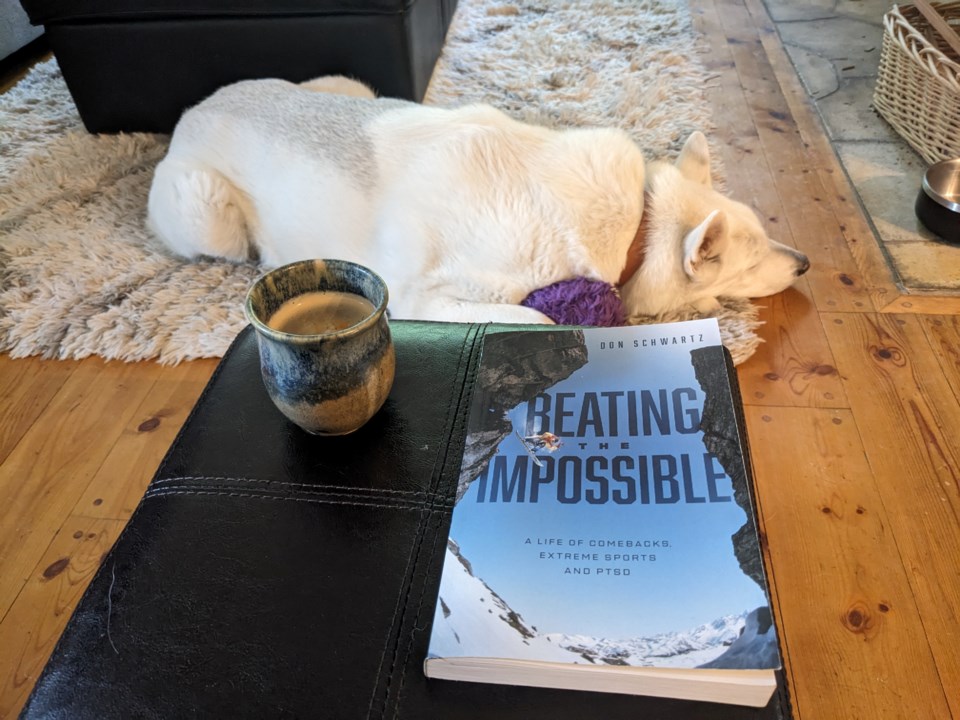I like to think there’s two different seasons in the final months of the year. There’s fall, which gives us the best biking conditions, the occasional sunny stretch and all that social media noise about pumpkins and feeling cosy in down jackets again. Then there’s pre-winter, which is colder, rainier, less about squeezing the last drops of summer activity and more about preparing your gear—and your body—for snowsports. The weeks of pre-winter can occur at different times each year, but I’d argue the “fall-back” time change in early November is a reliable baseline.
Pre-winter has a different meaning for me this year. Seven months into my nine-month recovery from two shoulder surgeries, I definitely have the worst of it behind me. When I say “worst of it,” I’m referring to the post-op pain, having one of my arms all but useless in a sling and last (but certainly not least), not being able to participate in my usual outdoor activities.
A part of any rehab process is realizing there’s always someone going through a tougher journey than you are (Whistler is renowned for injury one-upmanship, with people peeling back their clothes to show the scars of their own surgeries, all of which seem to come with a lengthy story). I currently have friends going through longer, more arduous rehabs of their own. I have friends and family who are battling cancer, either in their own bodies or that of their loved ones. You never have to look far in your friend circles to hear stories of overcoming extreme adversity, one that makes your own rehab “journey” seem like all you had to do was spend the better part of the year on the couch.
My birthday this year was just days before my first surgery, and my partner gave me a book about not only overcoming injuries and setbacks, but embarking on challenges that can change your life forever. That book is Beating the Impossible by longtime Whistler local Don Schwartz, who I interviewed for a 2013 Pique feature story titled, “Breaking Point.” The story was themed around the 20-kilometre Tough Mudder obstacle race, but I found Schwartz’s story much more compelling than the bro-down or corporate team building exercise one finds at Tough Mudder. Schwartz is a three-time participant in the Death Race, that masochistic event in the Vermont hills that tries to break its candidates mentally and physically over the course of several days with gruelling tasks and deceptive mind games. The intense training, preparation, and brutal physical output during the event and the weeks and sometimes months of recovery from the Death Race is just one part of the book, and it doesn’t come anywhere close to being the hardest thing Schwartz has ever done.
In 1990, at the age of 20, Schwartz survived a helicopter crash while heliskiing near Blue River, B.C. He walked away with burns that came close to killing him, but his conviction to survive was unbreakable. While living in the burn unit in Calgary, Schwartz endured torturous skin grafts as doctors attempted to make him whole again. Somehow, his intense meditative mental exercises helped him avoid major reconstruction of his ear and nose largely driven by his motivation to compete at an international snowboard event, just a casual couple of months later.
But what hit me as one of the most enduring journeys of his life (there are many in this book) was Schwartz having to wear a plastic burn mask full-time for four years in order to prevent the scars from disfiguring his face. These traumatic experiences are the ones that make a Death Race look easy, at least in Schwartz’s eyes.
Like I said, there’s always someone who has been through more than you. And those people have learned how to bounce back in a way most of us couldn’t even conceive.
After reading his book, I realize I don’t have Schwartz’s iron will. I don’t have the patience and determination to complete a Death Race, nor do I want to challenge the status quo of modern medicine by willing myself to heal faster and return to activity sooner than the doctors say I’m supposed to. But he is living proof that you can not only survive after knocking on death’s door, but you can accomplish more than you ever thought possible. Hitting rock bottom means you can only go up.
Beating the Impossible isn’t the only motivational survival story out there. But few stories are as relatable to the Whistler lifestyle and our desire to get back and play in mountains, where we belong. My own journey back to the life I was enjoying won’t be the same compelling narrative, but a small part of Schwartz’s disciplined approach to rehabilitation has indeed rubbed off on me. I’m waking up earlier to make sure I don’t miss my daily physiotherapy exercises. I’m eating better while drinking less (within reason). But mostly, I’m feeling more motivated than ever to get outside and return to doing what I love best.
Bring on winter. Let’s fucking go.
Vince Shuley hasn’t looked forward to ski season this much in a long time. For questions, comments or suggestions for The Outsider, email [email protected] or Instagram @whis_vince.




